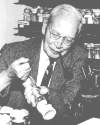 (source)
(source)
|
Alfred Henry Sturtevant
(21 Nov 1891 - 5 Apr 1970)
American geneticist who developed (1913) a technique for mapping the location of specific genes of the chromosomes in the fruit fly Drosophila.
|
Science Quotes by Alfred Henry Sturtevant (5 quotes)
Drosophila melanogaster has been more extensively used in the study of genetics than any other organism, and the theory of heredity that is now generally accepted is based chiefly on the results obtained with this fly. … Not only has Drosophila been the most productive material for research in the subject, but it is now the standard object for laboratory instruction, and is used as such in many colleges and universities.
— Alfred Henry Sturtevant
In The North American Species of Drosophila (1921), 12.
Drosophila melanogaster Meigen…has in recent years come to be widely used as a laboratory animal, especially in the study of heredity. Its short life-cycle, great productivity, and the ease with which it may be bred have been chiefly responsible for making it so popular for this purpose.
— Alfred Henry Sturtevant
In The North American Species of Drosophila (1921), 1.
The adults of Drosophila react positively to light, i.e., they go toward a source of light … whether the animals walk or fly. Removal of the wings causes the flies to become less responsive to light, … roughly proportional to the amount of the wing that is cut off. As was to be expected from this fact, mutant races with parts of the wings gone or deformed show the same relations—the smaller the amount of normal wing present, the less marked is the reaction to light.
— Alfred Henry Sturtevant
In The North American Species of Drosophila (1921), 4.
There has been a very large number of mutations discovered in the laboratory races of Drosophila melanogaster Meigen…. It…would be of considerable interest to get an idea of how these mutations compare with the differences between wild species of Drosophila.
— Alfred Henry Sturtevant
In The North American Species of Drosophila (1921), 1.
There is a reference in Aristotle to a gnat produced by larvae engendered in the slime of vinegar. This must have been Drosophila.
— Alfred Henry Sturtevant
A History of Genetics (1965), 43. Used as an Epigraph in M. M. Green, James F. Crow and William F. Dove (eds.), 'It Really Is Not a Fruit Fly', Genetics (Sep 2002), 162, 1. The article points out that Drosphila melanogaster now called the “fruit fly” was historically known in general genetics texts as the “pomace fly” (e.g. Castle, 1911) or the “vinegar fly” (e.g. Morgan, Bridges and Sturtevant, 1925). The article footnotes the origin as a sentence in Aristotle’s History of Animals, book 5, section 19: “The conops comes from a grub engendered in the slime of vinegar.” Whereas that insect would seen to be the “vinegar fly,” from descriptions elsewhere in Aristotle's writing, he also used the word “conops” for an insect like a mosquito.
See also:
- 21 Nov - short biography, births, deaths and events on date of Sturtevant's birth.
- History Of Genetics, by A. H. Sturtevant. - book suggestion.
 In science it often happens that scientists say, 'You know that's a really good argument; my position is mistaken,' and then they would actually change their minds and you never hear that old view from them again. They really do it. It doesn't happen as often as it should, because scientists are human and change is sometimes painful. But it happens every day. I cannot recall the last time something like that happened in politics or religion.
(1987) --
In science it often happens that scientists say, 'You know that's a really good argument; my position is mistaken,' and then they would actually change their minds and you never hear that old view from them again. They really do it. It doesn't happen as often as it should, because scientists are human and change is sometimes painful. But it happens every day. I cannot recall the last time something like that happened in politics or religion.
(1987) -- 


